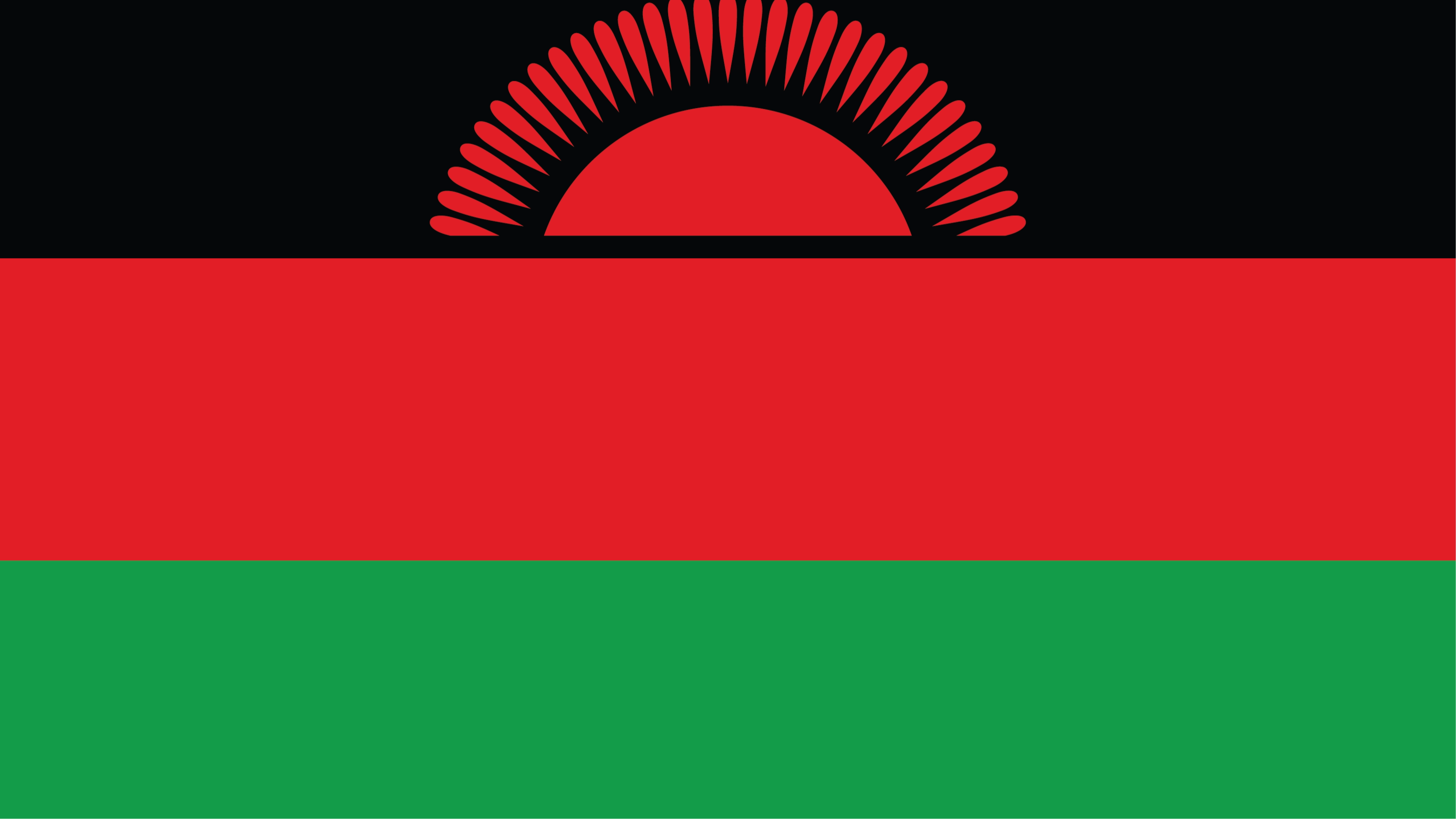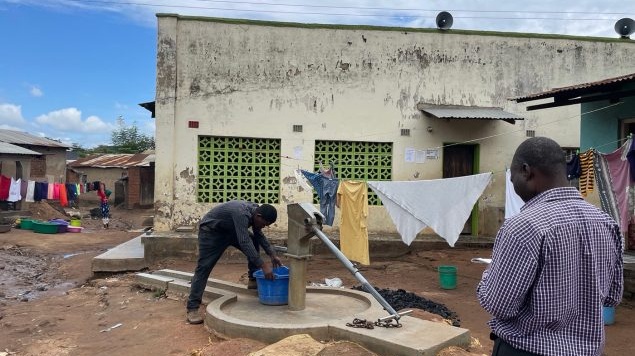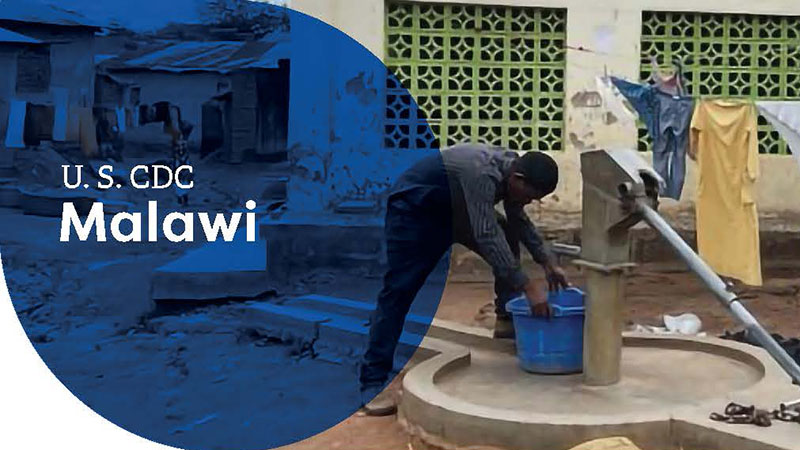At a glance
CDC works with the Ministry of Health (MOH) and other partners to build effective public health collaboration and partnerships, which strengthen the country's core public health capabilities: data and surveillance, laboratory capacity, workforce and institutions, prevention and response, innovation and research, and policy, communications, and diplomacy.

Overview

CDC established an office in Malawi in 2001. CDC Malawi works closely with the Government of Malawi and partner organizations to detect, prevent and control infectious disease outbreaks and build and strengthen the country's core public health capabilities. These include data and surveillance, laboratory capacity, workforce and institutions, prevention and response, innovation and research, and policy, communications, and diplomacy. CDC's work aims to protect the health of our nations and public health around the world. CDC Malawi also implements high-impact HIV and tuberculosis programs through the President's Emergency Plan for AIDS Relief (PEPFAR).
Global health security
CDC's technical support strengthens public health systems to prevent, detect, and respond to emerging infectious diseases. CDC focuses on real-time disease surveillance, laboratory systems and diagnostics, workforce development, and emergency management.
Laboratory systems strengthening
CDC supports the Public Health Institute of Malawi (PHIM) to develop the capacity to prepare for and respond to emerging diseases. PHIM's reference laboratories are producing specimen genotyping and proficiency panels for TB, HIV, Syphilis, and Hepatitis B tests. These efforts help to sustain the national quality assurance program.
CDC also supports a four-tiered approach (central, district, facility, and community) to strengthening laboratory capacity testing for HIV diagnostic and treatment monitoring, COVID-19, and TB. This work includes implementing continuous quality improvement for both conventional and point-of-care testing laboratories. All 28 districts in Malawi participate in this initiative.
Health information systems
CDC supports the implementation of the largest electronic medical record system in Malawi. CDC collaborated with the MOH to deploy and support infrastructure improvements. CDC's support also covers systems integration efforts to promote data visibility and use.
Workforce development
CDC partnered with the PHIM to establish the Field Epidemiology Training Program (FETP) in 2016. FETP trains field epidemiologists at community, subnational, and national levels to strengthen their capacity in disease and public health surveillance as well as outbreak investigation and response. Malawi's FETP program supports the frontline and intermediate levels of training.
Emergency response
Cholera
Malawi experienced the deadliest cholera outbreak in the country's history from 2022-2023, with over 59,000 cases and 1,770 deaths reported. CDC Malawi supported the cholera outbreak response by providing technical expertise and supporting emergency operations centers. CDC leveraged HIV, TB and COVID-19 funds to support the investigation and response. CDC also supported UNICEF in water, sanitation, and hygiene activities.
Polio
After 30 years without a poliovirus case, the Government of Malawi declared an outbreak in 2022 following confirmation of Wild Poliovirus Type 1. Since then, the country has reported four vaccine-derived poliovirus type 1 cases and a confirmed vaccine-derived poliovirus type 2 outbreak from an environmental surveillance sample.
Flaccid paralysis
CDC supported the implementation of enhanced acute flaccid paralysis surveillance by FETP graduates to improve active case search visits and the detection of poliovirus cases.
COVID-19
CDC's COVID-19 response activities included:
- Setting up diagnostic capacity at the national reference laboratory.
- Implementing COVID-19 response activities in five high-burden districts
- Establishing a COVID-19 sentinel surveillance system in five health facilities and two land points of entry.
- Providing support with community-based and facility-based surveys.
Key achievements
- More than 200 public health workers have graduated from Malawi's FETP since 2016.
- As of March 2024, 248 health workers completed frontline FETP over 20 cohorts, and 22 health workers completed the intermediate FETP over two cohorts from 2022.
- Participants helped the MOH to investigate the most recent cholera outbreak.
- Supported the national Public Health Emergency Operating Centre to coordinate emergency response activities.
- Over 760 facilities now have an electronic medical record system.
HIV and TB
As a key implementer of the U.S. President's Emergency Plan for AIDS Relief (PEPFAR), CDC plays an essential role in the fight against HIV and TB. With unmatched scientific and technical knowledge and long-standing relationships with ministries of health, CDC is uniquely positioned to advance HIV, TB, and other global health security activities that keep Americans safe at home and abroad.
Through PEPFAR, CDC provides critical support to Malawi's public health infrastructure, improving the country's ability to prevent, detect, and respond to HIV, TB, and other infectious diseases and minimizing their risk from entering the U.S.
Immunization

CDC provides technical and programmatic expertise to eradicate, eliminate or control vaccine-preventable diseases through immunizations. CDC works with international and local partners to strengthen immunization systems and provide evidence-based technical knowledge to expand routine vaccine delivery. This work helps prevent cases of infectious diseases like polio and measles.
CDC continues to support field activities in response to polio outbreaks in Malawi. This includes:
- Vaccination campaign planning
- Program monitoring
- Acute flaccid paralysis surveillance
- Outbreak investigations
- Community outreach
- Research
- Data management
CDC has also extended support towards field operations for COVID-19 campaigns aimed at bolstering population immunity.
Additionally, CDC has provided technical assistance for the Periodic Intensification of Routine Immunization (PIRI) initiative. PIRI aims to ensure that children receive essential immunizations.
Malaria
Malaria is endemic in Malawi. CDC has collaborated with the National Malaria Control Program and other partners to support implementation of malaria prevention and control activities in Malawi.
Recent studies have included:
- Evaluation of the effectiveness of first-line antimalarials.
- Assessments on expanding community case management for malaria from children under 5 to all ages.
- Evaluation of indoor residual spray and insecticide treated nets for malaria prevention.
- Assessments of the efficacy of an alternative medication for intermittent preventive treatment in pregnancy and of a new delivery method to increase its uptake.
Key achievements
- CDC-supported tracking found more insects in Malawi are resistant to pyrethroid insecticides. This led to strategic changes in the purchase of bed nets treated with insecticide.
- CDC developed a data platform (M-Dive) to target interventions in high-risk malaria districts.
- CDC's support has helped deliver:
- Over 18 million mosquito nets.
- Almost 73 million rapid diagnostic tests.
- More than 65 million fast acting malaria medicines.
- Over 16 million preventive treatments in pregnant women.
